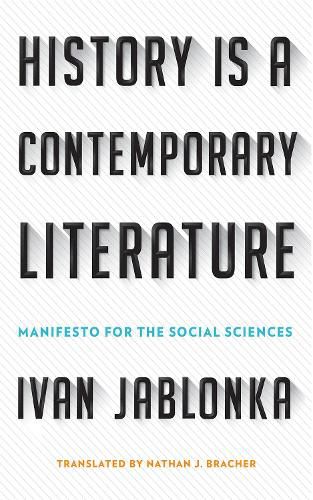Readings Newsletter
Become a Readings Member to make your shopping experience even easier.
Sign in or sign up for free!
You’re not far away from qualifying for FREE standard shipping within Australia
You’ve qualified for FREE standard shipping within Australia
The cart is loading…






Ivan Jablonka’s History Is a Contemporary Literature offers highly innovative perspectives on the writing of history, the relationship between literature and the social sciences, and the way that both social-scientific inquiry and literary explorations contribute to our understanding of the world. Jablonka argues that the act and art of writing, far from being an afterthought in the social sciences, should play a vital role in the production of knowledge in all stages of the researcher’s work and embody or even constitute the understanding obtained. History (along with sociology and anthropology) can, he contends, achieve both greater rigor and wider audiences by creating a literary experience through a broad spectrum of narrative modes.
Challenging scholars to adopt investigative, testimonial, and other experimental writing techniques as a way of creating and sharing knowledge, Jablonka envisions a social science literature that will inspire readers to become actively engaged in understanding their own pasts and to relate their histories to the present day. Lamenting the specialization that has isolated the academy from the rest of society, History Is a Contemporary Literature aims to bring imagination and audacity into the practice of scholarship, drawing on the techniques of literature to strengthen the methods of the social sciences.
$9.00 standard shipping within Australia
FREE standard shipping within Australia for orders over $100.00
Express & International shipping calculated at checkout
Ivan Jablonka’s History Is a Contemporary Literature offers highly innovative perspectives on the writing of history, the relationship between literature and the social sciences, and the way that both social-scientific inquiry and literary explorations contribute to our understanding of the world. Jablonka argues that the act and art of writing, far from being an afterthought in the social sciences, should play a vital role in the production of knowledge in all stages of the researcher’s work and embody or even constitute the understanding obtained. History (along with sociology and anthropology) can, he contends, achieve both greater rigor and wider audiences by creating a literary experience through a broad spectrum of narrative modes.
Challenging scholars to adopt investigative, testimonial, and other experimental writing techniques as a way of creating and sharing knowledge, Jablonka envisions a social science literature that will inspire readers to become actively engaged in understanding their own pasts and to relate their histories to the present day. Lamenting the specialization that has isolated the academy from the rest of society, History Is a Contemporary Literature aims to bring imagination and audacity into the practice of scholarship, drawing on the techniques of literature to strengthen the methods of the social sciences.